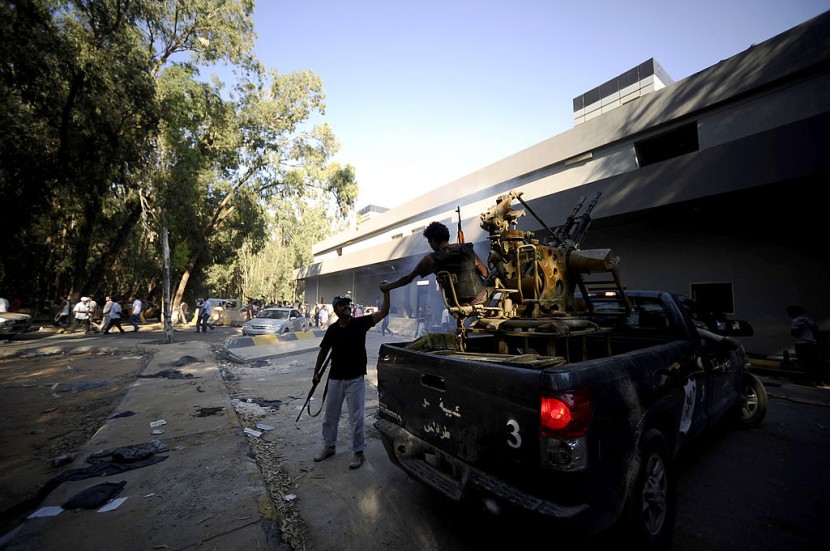
Amid a protracted political deadlock, deadly battles between militias backed by Libya's two competing governments broke out in the country's capital on Saturday.
The Libya Health Ministry reported at least 23 persons died and 140 were injured. It went on to mention that 64 households had been evacuated from locations near the conflict.
The escalation threatens to destabilize Libya's relative peace over the last two years, according to a report from AP News. Following a NATO-backed rebellion that deposed and executed longstanding tyrant Moammar Gadhafi in 2011, the oil-rich country descended into turmoil.
Mustafa Baraka, a comedian known for his social media videos ridiculing militias and corruption, was among those killed. According to Malek Merset, an emergency services spokeswoman, Baraka died after being shot in the chest.
Merset reported that emergency workers were still attempting to get civilians and people out of areas of violence that started overnight and went into Saturday evening.
War Crimes Committed
In a statement, the Health Ministry said that actions that "amount to war crimes" included shelling hospitals and medical facilities in the city and prohibiting paramedic personnel from evacuating civilians.
The Tripoli municipal council blamed the capital's worsening condition on the ruling political class and urged the international community to "protect civilians in Libya."
On Saturday, UN Secretary-General Antonio Guterres appealed for an "immediate cessation" of hostilities, CNN reported.
Stephane Dujarric, UN Secretary-General spokesperson, said the UN chief "urges the Libyan parties to engage in genuine dialogue to address the ongoing political impasse and refrain from using force to resolve their differences; he also urges the parties to protect civilians and refrain from taking any actions that could escalate tensions and deepen divisions."
The UN remains prepared "to provide good offices and mediation" to assist Libyan parties in charting a route out of the political gridlock that is "increasingly threatening Libya's hard-won stability," Dujarric stressed.
Read Also : Chinese Y-20 Aerial Tanker First Images Show Mid-air Refueling of Fighter Planes Reveal PLAAF Extended Range
According to a tweet from the US Embassy in Libya, US Ambassador to Libya Richard B. Norland emphasized the significance of "avoiding violent clashes in Tripoli."
The embassy tweeted Saturday that Norland and Presidential Council President Menfi underlined the need for de-escalation on Friday.
"We agreed on the urgent need to finalize a constitutional basis and move towards elections, and also on the importance of taking steps to enhance transparency and accountability in the management of Libyan oil revenues," the tweet added.
Rival Political Parties Exchange Blame
The current eruption of violence in Libya, where two opposing sets of authority are caught in a political deadlock, threatens the country's tenuous stability after almost 10 years of civil conflict.
According to a report from The Libya Update, when 60-year-old Fathi Bashagha was chosen by the House of Representatives to serve as interim premier of Libya last February, it effectively ended the legal legitimacy of his 63-year-old rival Abdul Hamid Dbeibeh, whose government had failed to hold national elections in December 2021 as required by the U.N.-led peace plan.
The Dbeibeh administration, which has resisted surrendering power and is still regarded as the nation's supreme authority by the international world, has denounced the clashes and accused Bashagha-supported troops of starting the fighting.
The government expressed its regret for Bashagha's "treachery and betrayal" in a statement posted on its official Facebook page. It claimed that both parties were engaged in "negotiations to spare the capital the carnage" until Bashagha "evaded" talks.
However, in response, Bashagha's media office issued a statement disputing Dbeibeh's government's assertion that Bashagha refused to engage in negotiations.
"For six months, Prime Minister Fathi Bashagha has welcomed local and international measures to address the dilemma of peaceful power transfer," Bashagha's media office said in a statement.
Osama Ali, a spokesperson for Tripoli's ambulance and emergency services, demanded an end to all violence from all parties, as he held the parties involved in the fighting accountable for ensuring the protection of the people.
Related Article : Moscow Offers Reward on Neo-Nazis Suspected of Slaying, Torturing Captured Russian Soldiers
© 2026 HNGN, All rights reserved. Do not reproduce without permission.








